- Home
- David Levithan
The Full Spectrum Page 9
The Full Spectrum Read online
Page 9
Recently, I was faced with a harsh reality. Since the age of nine I have wanted nothing more in life than to become an orthopedic surgeon in the United States Air Force. It was the one thing in my life that I wanted to do to make myself happy. However, a very important person to me, who is in the reserves, told me that due to the ignorance of the nation's government, I would not be able to serve my country.
First, I was told that I would not be able to serve because I am transgender. What does it say about our country if we are denying people the right to serve their country and tell them that their desire to put their lives on the line for the sake of America is not honored because of their gender identity or sexual orientation?
I am also ineligible due to the fact that I am medically diagnosed with cerebral palsy. This is a muscle disorder caused by my mother's drug use while she was pregnant with me. I went through ten operations to have the ability to walk. This is a physical disability that doesn't stop me from running two and a half miles in twenty minutes, or doing three hundred push-ups, among other things. I am fully able to live life like a normal teenager, and enjoy skateboarding, snowboarding, lacrosse, tennis, Hacky Sack, and other activities.
I am the type of person who gets a dream and stops at nothing until I get it. When people tell me “no” or “you can't do it,” that makes me want it even more. Even if I don't serve my country, I will spend my life fighting for the rights of others like me to fulfill their dreams.
I am part of the up-and-coming queer generation, and standing on the front lines of the battle. Growing up and living as a transgender youth has been quite an adventure. My name is Alex and I am an eighteen-year-old female-to-male. I am strong. I am smart. I am willing to fight, not quit. I am willing to show the world and everyone in my life that ever challenged my abilities that I can do the seemingly impossible. I am courageous and brave. I am hurt and in pain. I am angry. I am a perfectionist. I am stressed, worried, and scared about my future. I need love and acceptance. I need support, and I need confidence. I am an eighteen-year-old male who is trapped and scared. But I am not alone.
I have been given the chance to write my story and my hope is that it will not only help me, but that it will help any other youth who is feeling alone, trapped and stuck. I want to let them know that there is hope and a way out, but one has to keep fighting. For those who feel trapped, alone, diseased, scared, and stuck, there is hope. There are people out there who feel the same. You are not alone. There is someone out there who cares.
Queer: Five Letters
by Kat Wilson
Dear Mr. Lindstrom,
Your last fifth-grade class gave you hell. The girls were cruel to one another, constantly hurting each other with sharp words and cutting silences. The students competed for grades like their lives depended on it. They taunted you about your earring and asked if you were gay. You said it was none of their business, but they wouldn't drop it. They were so involved with their squabbles and speculations about your personal life that they didn't absorb what you had to give them as a teacher: the proper form for a business letter, accurate spelling, good cursive, and the all-important ability to express themselves with words.
And of course there was that one student. She was in the thick of the cruel girls, and without fail she believed herself to be the wronged party. She was bright, but defiant. You'd assign a report on North America and she'd turn in ten pages on the Canadian parliament. You'd assign an essay on “My Magic Racecar” and she would turn in an essay on why she thought it was a dumb topic. She scrawled “I HATE WRITING” on the cover of her creative-writing notebook; you'd bought one for each student out of your own pocket.
Well, Mr. Lindstrom, here I am. It's been ten years, but I hope you will accept my apology. I'm sorry that I didn't speak up when my classmates taunted you. I'm sorry I defaced the writing notebook. I'm sorry I was too busy rebelling to take in what you were teaching. I've come to appreciate how right you were about business letters, proper spelling, and neat cursive. I want to thank you for the emphasis on daily writing. I didn't take to it at first, but two years after I left your classroom behind I caught the writing bug, and I've been feverish with it ever since. Thank you for laying the groundwork.
Hating writing no longer,
Kat Wilson
Dear Joanna,
You'll probably never read this letter. That's okay; even though it's to you, I'm not writing it for you. I need to explain why I'm angry, and why my respect for you ended when you came out.
As I child, I idolized you. You were a beautiful, independent college student. You were loved and respected by the people I wanted love and respect from. You were wise, you could sing, you could paint. You were radiant. You had a marriage everyone admired. I wanted to be what you were, and I wanted to have what you had.
When you moved to Indiana, I missed you. Like everyone else from our church, I was proud when your art started to bring you success. And maybe more than anyone else, I was glad when you came back. By then, I had started making friends across age differences like ours, and I thought we could be friends. I tried to build a bridge to you, but somehow it was never more than a one-way effort, an incomplete arch.
That untraveled bridge hurt, but it was the least of my problems. I was learning the hard way that the Christian church we shared wasn't ready to walk their talk about inclusion. I stood up one Sunday in worship and laid it all out, my homosexuality and my daily battle wondering if God had built me this way. There was no unified response. Some people told me I was an embodiment of God's love, and some people told me I was going to hell.
Being fifteen and the only out person at church was tough. As I battled despair and tried to name what would help me feel safe, there was one thing that kept coming back to me: I needed a role model. I needed somebody to help me lead the way, somebody who could speak from personal experience, someone who could make it clear I wasn't a representative for all queer people. As wonderful as my straight allies were, there were some things they just couldn't do. I needed somebody I could laugh with about the awkwardness. Living with the loneliness of being a single zebra in a herd of horses was sometimes so painful I didn't want to live at all. I had one close call, got near enough to see the whites of Death's eyes, but I stuck it out even though I was scared, even though people said ugly things.
A year after the worst of my ordeal at church had passed, you quietly divorced your husband. There were rumors you were gay. You packed up your house, sold your art. Almost as an afterthought you came out to me. I tried to welcome you, tried to tell you a little of what I'd learned from being first, but I didn't know what to say. You didn't stick around to see if the path I'd forged was trustworthy. You moved three thousand miles away. You said it was what God was calling you to do, but all I could see was that what I had achieved toward safety for people like us at church wasn't good enough for you. That was when you lost my respect.
Where were you when I needed someone to help me explain that being gay isn't about what two women do in bed, or that gay and pedophile aren't synonyms? How dare you stay hidden when you could have brought me the hope and company I was starving for? How dare you run away when even I could muster the strength to stay?
I understand why you didn't want to be the first, but once I came out, why didn't you join me? I was desperate for reinforcements. My life was hanging in the balance. I'm haunted by the nearness of my escape. You had the power to transform my hell into something more livable, and you didn't use it. I don't know if I can forgive you for that.
Kat Wilson
Dear Mom and Dad,
At the time, I didn't know that coming out to one's parents should be carefully planned, preferably with brochures on hand and prepared “I” statements. I didn't know that there were whole Web sites, whole books, dedicated to the subject of how to say “I'm gay” without shutting down the lines of communication. I just knew I wanted you two to know what I knew about myself, that straight didn't fit the shape of me.<
br />
My method wasn't complicated. I checked out every book the library had on queer youth, fiction and nonfiction. They had seventy-six. I spread the books over the house, stacked on the kitchen counter, balanced on the arms of the couch, perched by your desk chairs, piled on the coffee table, and liberally scattered around my bedroom. A few days later one of you said in passing, “So, you think you might be gay?” and I said, “Yes.” Just those three letters. You've been behind me ever since. As I've gone public and activist in the queer arena, I've suffered plenty of doubt, but never about your support.
When people ask me, in that careful tone used for approaching sensitive topics, “And your parents, are they okay with it?” I tell them this: If parents are assigned by lottery, I won the hundred-million-dollar jackpot.
I love you.
Your daughter,
Kat
Dear Margaret,
It must have been terrifying to see your only child, your precious daughter, turn thirteen and grow into a head-turning beauty strangers lusted over. I know it scared me to see the girl I'd been a tutor, babysitter, and friend to become a young woman in possession of her own sexuality. I think we were both afraid that someone would try to force sex on her. Never mind that she was, and is, strong and able to defend herself. We were both worried beyond reason, you as a mother, and I because I am an only child, too, and she was the nearest I had to a little sister.
I was frank with you from the beginning. I wanted you to know from the outset that I was gay so you couldn't use my hiding it as evidence against me. I knew you were uncomfortable with homosexuality, so I was careful with physical boundaries with your daughter. When she initiated hugs, I kept them one-armed. When she, ten-year-old that she was, asked me to tickle her, I suggested we play cards instead.
We are two different people, and we coped with the gnawing fear for her in different ways. I dealt with my fear by trying to arm her with knowledge about the carnal things you kept her ignorant of. I had no right to trespass on your decision to keep words like penis, vagina, clitoris, masturbate, and lesbian from her, but I thought that having words for those things might help her protect herself if someone tried to use those words to have power over her. I tried to use them in a safe context, to reduce the squirm factor so no one could take advantage of her discomfort with them. I remember being thirteen, and I know there were times at that age when my knowledge about sex helped keep me safe. I knew your daughter was uncomfortable with my talk. I didn't know that she spoke of it to you.
You dealt with your fear for her by trying to control her life, trying to keep out any monsters and molesters. When she told you about my use of sex words, it got combined with your suppressed homophobia. There I was, and in your view, I was the monster in waiting, ready to become a molester at the first opportunity.
It was all very rational. You explained carefully to my answering machine, talking as fast as an oncoming train, that I would no longer be seeing your daughter without a chaperone, because otherwise I might rape her. You'd known me my whole life. You went to college with my parents. I thought there had been a mistake. I called back, tried to listen well enough to hear what you were saying underneath your accusations. All I heard was that you saw in me the embodiment of our worst fears. I hung up, numb.
The next few weeks were a haze of pain for me. Several people tried to orchestrate a reconciliation between us, but I wasn't having any of it. I felt that the only way for me to function was to avoid you altogether. Our families had many friends in common, and you called to try to arrange logistics, so that I could see my friends without worrying about seeing you. In retrospect, it was a sweet thing to do. You even sent a card, which I still have in a box somewhere, with a near-apology written on it. I remember being amazed by that, even then. We are neither of us good at admitting to being wrong.
I did not have the courage then to give you a chance to see if we could rebuild what was broken. I don't think I had the capacity for that kind of courage at the time. It's only in these past two years, as I have healed from your words (which I know you would take back if you could), that I have found the depth of compassion and forgiveness I needed then. There will always be some scar tissue that sticks out funny, but I know the shape of it better now: I was wrong, as well as wronged.
I miss having the next best thing to a little sister. I want to be part of your daughter's life again, if she will have me. Will you talk with me again about what parameters would let you feel she is safe when I am around? If that means sitting ten feet away from her at all times with you in between, I'm okay with that. I don't want to miss out on any more of her life than I already have. Please call me.
In hope,
Kat Wilson
Dear Steve,
I miss you, your warmth, the way I felt safe with you. I know, rationally, that I was too young when you were alive to remember you. I was only two those last months when my parents and I lived with you and they nursed you through pneumonia again. My dad says it wasn't the AIDS that killed you, or the pneumonia (you'd beat that before), but that you died from giving up.
It's a rare week when I don't think of you. There are places in my mom's life that haven't been refilled since she lost her best friend, and I think of you when I see them. I wonder how my life might have been different if you had been able to stay, to provide some ballast for her. There are things you did for her that I will never be able to do, no matter how hard I try, and she trusted you in ways that she has trusted no one since.
When I hear about other people's harsh, hurtful families, I think about the stories my parents tell about you in their soft moments. I know it was you who took my father in hand and took the rough edges off his homophobia, and you who taught my folks how to be parents who never left any doubt that they loved me regardless of sexual orientation.
I wish you hadn't died, that you were here to see me growing into my dreams. I wish I could ask your advice about the things I don't talk to my parents about. I wish you could give me a hug. Mostly, though, I am thankful that you lived long enough to give me a legacy of love.
I remember you in my heart always.
Kat
Falling Off My Bike and Riding into the Sunset
by Christopher Wilcox
In March 2002 I began what would become some difficult months and years in my life. For this would officially begin my coming out to friends, co-workers, and most importantly, my family. I had questioned my sexuality before but had never acted on any impulses. At the time, I was twenty—twenty-one in a few months— and came from a divorced family with a very strong Catholic background. I had attended a private Catholic grade school and had gone on to a public high school, the first in my family not to attend the local Catholic high school. Of course, as a Catholic I had been taught that being gay was bad and that gay people were sinning by not following the Bible, and thus would burn in hell. I was afraid that if I were gay, I would be sentenced to hell for eternity and wouldn't be with my family in heaven. I didn't want that and, needless to say, neither did my family.
On March 1, 2002, I attended a dinner party hosted by a gay couple, one of whom I had met at the police department where I worked. John, who would become my best friend and my rock, had always known that I was gay and would try to persuade me that it was okay and that I wouldn't burn in hell. Mike, John's partner, had invited a boy, Patrick, who was nineteen and single. The thought was for the two of us to meet and see what, if anything, would happen. So I met Patrick and was instantly attracted to him. He was tall, blond, and had the most wonderful eyes. The feeling between us was mutual, and for the weekend we were inseparable. After the weekend, Mike took Patrick up to the south suburbs of Chicago so he could visit his friends.
He was back in Bradley three days later, staying with John and Mike. I, too, began staying there, because of Patrick. I was finding myself falling in love with him. He would become my first love and first boyfriend. I couldn't stand to be separated from him and could hardly wait
for my workday to end so I could see him. He was in town for a week and then had to go back home. He lived in Indiana, two and a half hours away from me. Within two weeks, we realized that we had to be near and with each other. With the permission of John and Mike, Patrick moved in with them.
Soon after Patrick returned, he pushed me to come out to my mom, something that I wasn't ready for and something I didn't want to do. One night I called my mom to let her know I was once again staying at a friend's house and used the lame excuse that I had been drinking and didn't want to drive home. She had always, just like other parents, wanted me to stay put if I was drinking or to call for a ride. I didn't want her to know where I was staying because she was already having a hard time with me spending time with my friends Mike and John. She said they were too old for me and that they would corrupt me—turn me gay. She told me that she wanted me home and didn't approve of me staying out during the middle of the week. We argued on the phone back and forth. Patrick pushed me, prompting me to tell her now, if I really cared about him. I blurted out to her that I was gay.
She yelled, screamed, cried, and eventually hung up on me. She didn't want to talk to me; she didn't want to try to understand. All she could say (and still does to this day) is that I'm going to hell because I'm sinning. I cried all night long. I was upset with myself that I'd disappointed my mom, something I didn't ever do. I was the good child, the angel, but not anymore. I cried because I knew I'd hurt my mom and hadn't intended to or wanted to. I cried because I had finally been able to tell someone what I was feeling inside. And I cried because I didn't have to hide my secret anymore. It wasn't the best time for me to come out to her, but it felt great to tell someone.

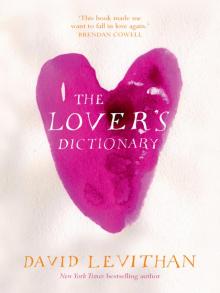 The Lover's Dictionary
The Lover's Dictionary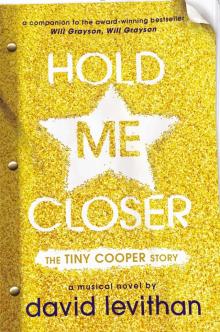 Hold Me Closer: The Tiny Cooper Story
Hold Me Closer: The Tiny Cooper Story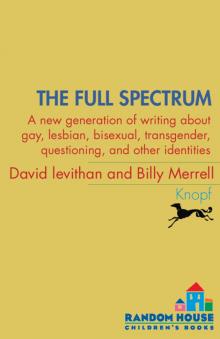 The Full Spectrum
The Full Spectrum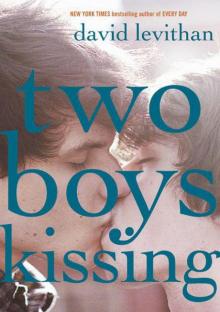 Two Boys Kissing
Two Boys Kissing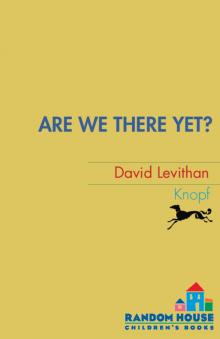 Are We There Yet?
Are We There Yet?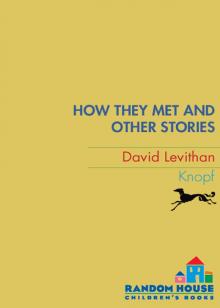 How They Met and Other Stories
How They Met and Other Stories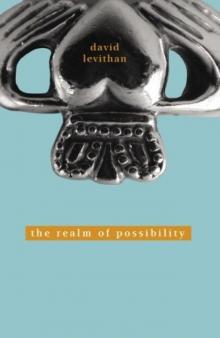 The Realm of Possibility
The Realm of Possibility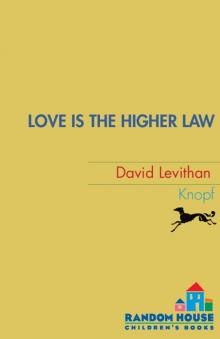 Love Is the Higher Law
Love Is the Higher Law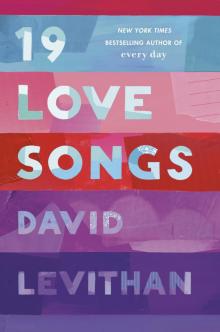 19 Love Songs
19 Love Songs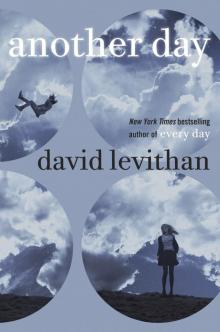 Another Day
Another Day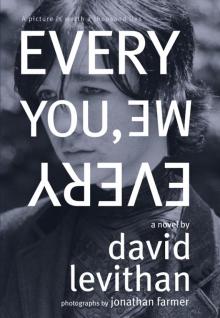 Every You, Every Me
Every You, Every Me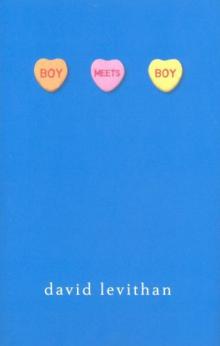 Boy Meets Boy
Boy Meets Boy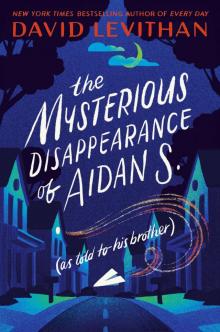 The Mysterious Disappearance of Aidan S. (as told to his brother)
The Mysterious Disappearance of Aidan S. (as told to his brother)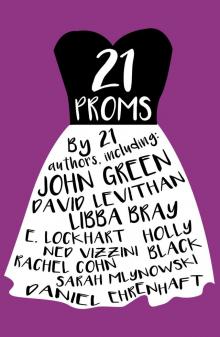 21 Proms
21 Proms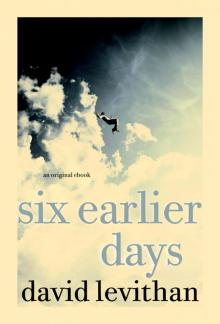 Six Earlier Days
Six Earlier Days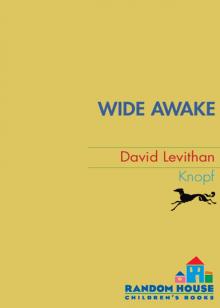 Wide Awake
Wide Awake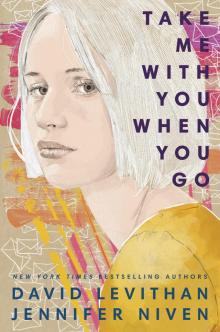 Take Me With You When You Go
Take Me With You When You Go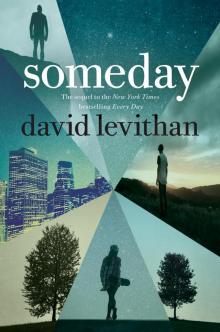 Someday
Someday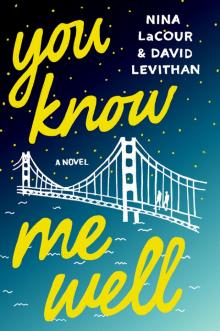 You Know Me Well
You Know Me Well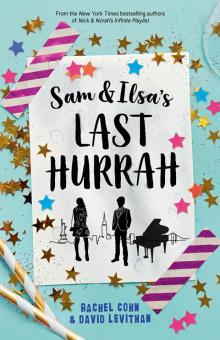 Sam and Ilsa's Last Hurrah
Sam and Ilsa's Last Hurrah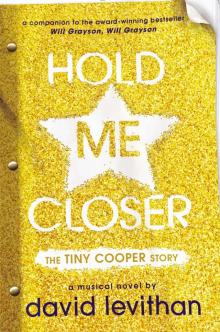 Hold Me Closer
Hold Me Closer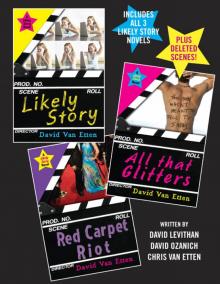 Likely Story!
Likely Story!